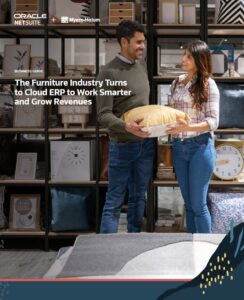
Furniture Industry: Overcoming Challenges and Driving Revenue with Cloud ERP
Published on by The Myers-Holum Team
In the dynamic world of furniture manufacturing, wholesaling, and retailing, staying competitive is crucial for revenue growth and business success. This article explores the evolving landscape of the furniture industry and how companies are adapting to thrive in a fiercely competitive market and is informed directly from the in-depth white paper available at the end of this article.
The demand for beautiful and functional furniture is perpetual, whether for renovating existing homes or furnishing new spaces. In 2022, the furniture industry in the United States generated well over $200 billion in revenues. Today, the United States retains its position as the world's largest furniture market.
Diverse Business Models
Within the furniture industry, companies adopt a wide range of business models to cater to diverse consumer demands. Some businesses choose to be vertically integrated, managing every aspect of their supply chain, from manufacturing to delivery. Other companies focus exclusively on e-commerce and rely on contract manufacturing partners to fulfill orders.
Challenges to Growth with Legacy Systems
Regardless of their chosen business model, many furniture companies encounter a common obstacle – the reliance on legacy systems, supplier-specific platforms, spreadsheets, and manual processes to run their operations. These disparate systems result in fragmented data management, making it challenging to seamlessly connect orders, manufacturing processes, and financials. This disjointed approach can hinder operational efficiency and growth.
Addressing Challenges: Cloud ERP for Furniture Industry
Recognizing the need for transformative solutions, furniture companies are actively seeking ways to streamline operations and overcome legacy system challenges. They understand that connecting various facets of their business is essential for remaining competitive and meeting customer expectations. A robust and comprehensive cloud ERP such as NetSuite streamlines and unifies critical business processes. NetSuite ERP provides furniture companies with an integrated platform that connects order management, manufacturing, inventory control, financials, and more, offering a consolidated view of their entire operations. A few key benefits that Myers-Holum customers have seen after implementing NetSuite are:
- Streamlined Operations. NetSuite helps eliminate silos between different aspects of the business, so that orders, manufacturing, and financials can be seamlessly connected.
- Data Visibility. Furniture companies gain insights into their operations, enabling informed decision-making and greater efficiencies.
- Scalability. As businesses grow, NetSuite scales with them, accommodating evolving needs and complexities.
Innovation and Adaptability
In an industry that values innovation and adaptability, furniture companies are exploring new ways to address challenges and drive revenue. By embracing cloud ERP and optimizing their operations, these businesses aim to enhance customer experiences and maintain their competitive edge. As the furniture industry continues to evolve, staying agile and responsive to changing market dynamics will be key to long-term success.
BUSINESS GUIDE
The Furniture Industry Turns to Cloud ERP to Work Smarter and Grow Revenues





